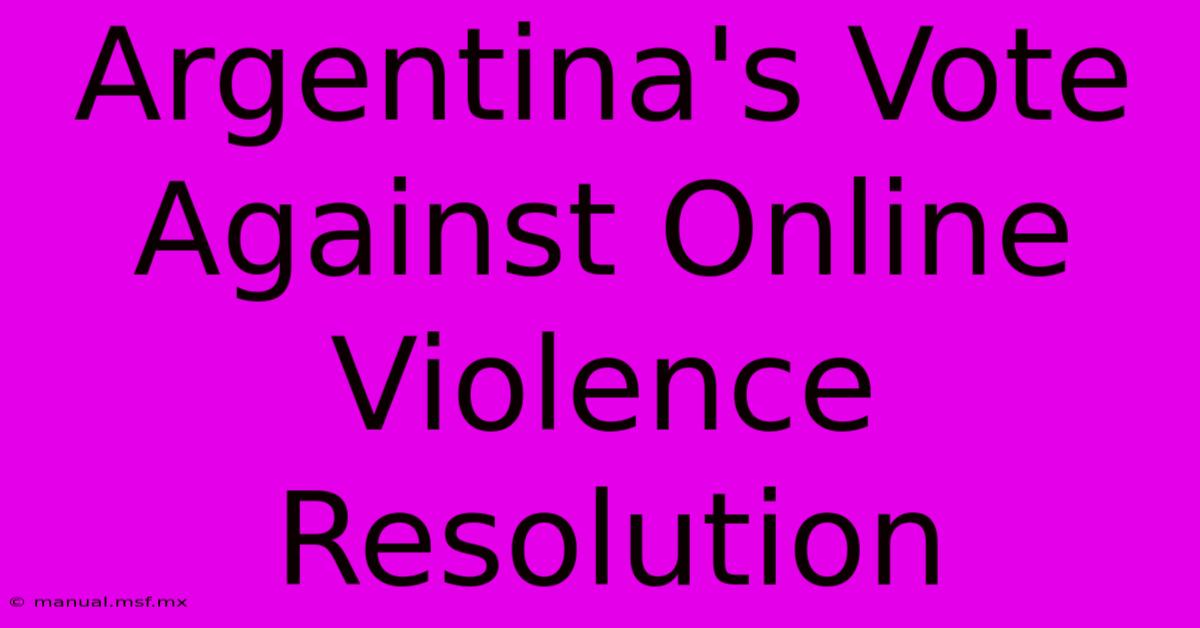Argentina's Vote Against Online Violence Resolution

Discover more detailed and exciting information on our website. Click the link below to start your adventure: Visit Best Website. Don't miss out!
Table of Contents
Argentina's Vote Against Online Violence Resolution: A Controversial Decision Explained
Can international agreements truly curb online violence? Argentina's recent vote against a UN resolution on online violence raises questions about the effectiveness and potential impact of such agreements.
Editor Note: Argentina's vote against the UN resolution on online violence has sparked controversy and debate. It's crucial to understand the context and implications of this decision.
This topic is important as it highlights the complexities of tackling online violence in a globalized world. The resolution aimed to address a significant problem, but its effectiveness is contested. Understanding Argentina's stance and the broader debate surrounding the resolution can shed light on the challenges of international cooperation in regulating online spaces.
Our analysis delves into Argentina's reasoning, examines the potential implications of this decision, and explores the broader context of online violence and its global impact. We've also considered various semantic and LSI keywords related to online violence, digital rights, international law, and Argentina's digital policies.
Key Takeaways:
| Aspect | Details |
|---|---|
| Resolution Scope | The resolution aimed to combat online violence against women and girls. |
| Argentina's Stance | Argentina argued that the resolution was too broad and lacked concrete measures. |
| Potential Impact | The vote could hinder international efforts to address online violence. |
Argentina's Vote: A Deeper Dive
The UN resolution aimed to combat online violence against women and girls by promoting policies and mechanisms for addressing this issue. However, Argentina argued that the resolution was too broad and lacked concrete measures for implementation. They expressed concerns about the potential for censorship and restrictions on freedom of expression.
The Resolution's Scope and Intent
The resolution aimed to address a critical issue: online violence against women and girls. It sought to create a framework for international cooperation, encouraging member states to implement policies and initiatives to combat this form of violence. This includes fostering awareness, providing support services for victims, and promoting digital literacy to prevent online abuse.
Arguments for and Against the Resolution
Proponents of the resolution argued that it was necessary to address the growing problem of online violence, particularly against women and girls. They emphasized the need for international cooperation to combat this issue, which transcends national borders.
Opponents, including Argentina, argued that the resolution was too broad and lacked concrete measures. They expressed concerns about the potential for censorship and restrictions on freedom of expression, highlighting the importance of balancing online safety with the protection of fundamental rights.
Argentina's Concerns
Argentina's decision to abstain was based on concerns about the resolution's scope and its potential impact on freedom of expression. The country argued that the resolution lacked specific measures for implementation and could lead to censorship and restrictions on online discourse. They emphasized the importance of addressing online violence in a way that respects individual rights and freedom of speech.
The Impact of Argentina's Vote
Argentina's vote has sparked debate and raised questions about the effectiveness of international agreements in addressing online violence. While some argue that the resolution was a significant step forward, others believe that its lack of concrete measures and potential for overreach could hinder its effectiveness.
Conclusion
Argentina's vote against the UN resolution on online violence highlights the complexities of addressing this issue in a globalized world. While the resolution aimed to combat a serious problem, its effectiveness is contested, and its implementation requires careful consideration to ensure that it does not infringe upon fundamental rights. The debate surrounding this vote underscores the need for a nuanced approach to tackling online violence, balancing safety with freedom of expression and ensuring effective implementation of international agreements.

Thank you for visiting our website wich cover about Argentina's Vote Against Online Violence Resolution. We hope the information provided has been useful to you. Feel free to contact us if you have any questions or need further assistance. See you next time and dont miss to bookmark.
Also read the following articles
| Article Title | Date |
|---|---|
| Obsessie Met Bananen Zweedse Minister | Nov 15, 2024 |
| Paddy Mc Guinness Amazed By Charity Donations | Nov 15, 2024 |
| Dood Vermiste Man 60 Bevestigd In Drents Dorp | Nov 15, 2024 |
| Prediksi Pemain Timnas Indonesia Di Bawah Ole | Nov 15, 2024 |
| Tech Tonic Ai Supremacy And Metas Llama | Nov 15, 2024 |
| Onion Acquires Infowars In Bankruptcy Deal | Nov 15, 2024 |
| Rfk Jr Trumps Health Department Choice | Nov 15, 2024 |
| Argentina Debates Leaving Paris Climate Pact | Nov 15, 2024 |
| Stadler Umsatz Erwartungen Sinken | Nov 15, 2024 |
| Trump Taps Rfk Jr For Hhs | Nov 15, 2024 |
